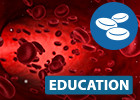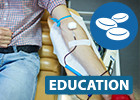Dementia in primary care: Recognising and managing behavioural and psychological symptoms and physical comorbidities
Behavioural and psychological symptoms of dementia (BPSD) can lead to quality of life impacts in not only the individual with dementia, but also others around them. This module explores the assessment of BPSD using the ABC (antecedent, behaviour, consequence) model, and discusses the management of BPSD using pharmacological and non-pharmacological methods as well as the management of comorbid conditions associated with dementia.









